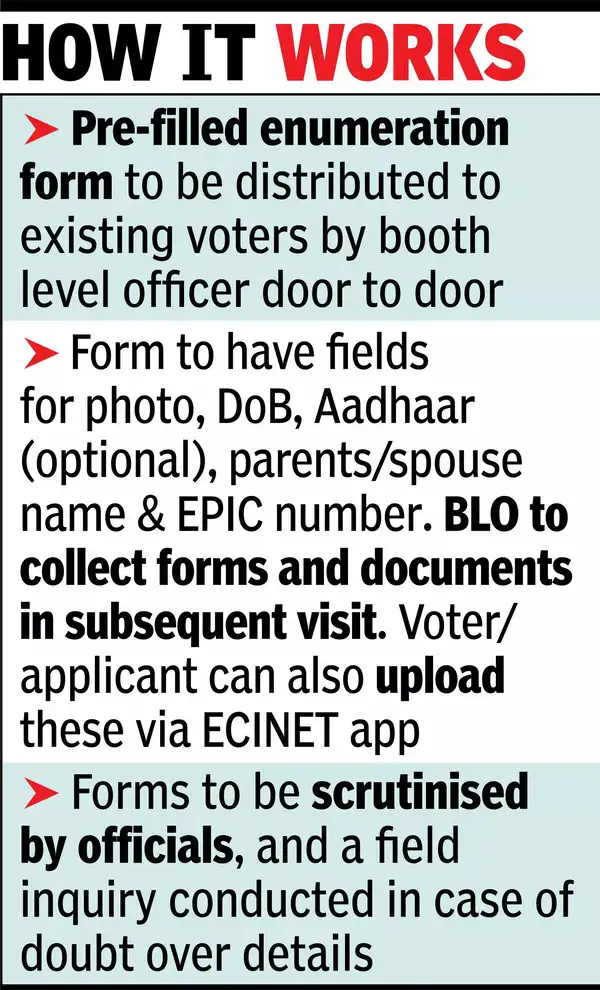NEW DELHI: In a decision aimed at weeding out illegal immigrants erroneously included in the nationwide electoral roll, the Election Commission has made it mandatory for new applicants as well as existing voters – enrolled after the last special intensive revision (SIR) undertaken in 2003-04 – to submit a self-attested declaration that they are Indian citizens, whether by birth or registration/naturalisation, and back it up with documentary proof of date and place of birth or certificate of registration/naturalisation.While the SIR for Bihar, where polls are due later this year, will start Wednesday – with the roll published in Jan 2003 serving as the draft roll – the schedule for the rest of India will be ordered “separately in due course”, the Election Commission said in an order Tuesday.

In an order issued on Tuesday, Election Commission – comprising chief election commissioner Gyanesh Kumar and election commissioners S S Sandhu and Vivek Joshi – invoked its powers under Section 21 of Representation of the People Act, 1950, to order an SIR across the country in “discharge of its constitutional mandate (under Article 326) to protect the integrity of the electoral roll”.No documents will be collected from those who figured in the 2003 Bihar roll, except the extract of the roll. “EROs shall treat the electoral roll of 2003… as probative evidence of eligibility, including presumption of citizenship unless they receive any input otherwise,” the poll panel said.All other voters in Bihar must, in addition to the pre-filled enumeration form, furnish a declaration that they are above 18 years of age and ordinary resident of the relevant assembly constituency/parliamentary constituency (AC/PC), besides listing their citizenship status and proof through 11 eligible documents. The document submitted will be uploaded on the EC portal.In line with provisions of Citizenship Act and rules, the declarations require new and shifted voters to declare if they were born in India prior to July 1, 1987, in which case they must choose from a list of 11 documents to establish their date and place of birth. If born in India between July 1, 1987, and Dec 2, 2012, they must also provide a listed document for their father or mother. If born after Dec 2, 2004, they must provide their own and their parents’ proof of date and place of birth. If either parent is non-Indian, they must provide a copy of the parent’s valid passport and visa at the time of their birth.The declarations also require eligible electors or applicants to attach proof of birth registration issued by an Indian mission abroad if born outside India; or the certificate of registration of Indian citizenship if acquired by registration/naturalisation. “This is a historic step. Strictly in accordance with Article 326, only Indian citizens above 18 years of age and ordinary residents can vote from today onwards,” a senior EC functionary told TOI.As per SIR guidelines, a pre-filled enumeration form will be printed by the electoral registration officer for all existing electors and distributed by the booth level officer through house-to-house visits. The form will have fields like an updated photo, date of birth, Aadhaar (optional), mobile number, and parents/spouse name and EPIC number. The BLO will collect these forms and documents in a subsequent house visit; elector/applicant can also upload these via ECINET app. The forms will be scrutinised by the ERO/asst ERO and in case of doubt about eligibility of a proposed elector, ERO/AERO will conduct a field inquiry and pass a speaking order on his inclusion/exclusion, before the final roll is published.Such special intensive revisions have been carried out 13 times since 1952, with the last taking place in 2004.



